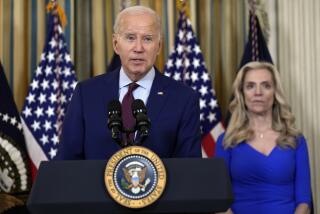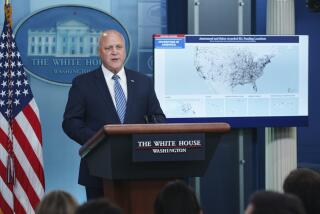SPURRING TELECOMMUNICATIONS COMPETITION : Regulatory Overhaul Launched : Technology: Vice President Gore outlines initiative to modernize the country’s electronic information infrastructure.
- Share via
WASHINGTON — Vice President Al Gore on Tuesday called for the biggest overhaul of the nation’s communications laws in more than half a century, launching an anticipated White House effort to transform the electronic network that provides Americans with telephone, data and television services.
Gore, a key advocate of government efforts on behalf of advanced technology, outlined an ambitious legislative initiative that would throw the $300-billion-a-year telecommunications business wide open to competition.
He said the Clinton Administration wants to speed the modernization of the electronic information infrastructure by eliminating restrictions that prevent cable television operators, phone companies and long-distance carriers from entering each other’s markets.
At the same time, the White House wants to retain a “regulatory safety net” to ensure that the nation is not split into “a society of information ‘haves’ and ‘have-nots,’ ” Gore said in a speech before the National Press Club.
“The Administration will support removal, over time and under appropriate conditions, of judicial and legislative restrictions on all types of telecommunications companies: cable, telephone, utilities, television and satellite,” Gore said. “We will do this through both legislative and administrative proposals prepared after extensive consultation with Congress, industry, public interest and consumers groups.”
Gore said the proposed overhaul would amount to “the most major surgery on the Communications Act since it was enacted in 1934.”
The vice president described the Administration’s plans in broad terms, noting that he will give a more detailed picture during a Jan. 11 visit to Los Angeles.
The White House initiative would be the most important attack yet on the regulatory bulwark surrounding a burgeoning industry that has become the electronic lifeblood of the nation’s commerce and culture.
The promise of advanced telecommunications technologies, such as interactive television, has been held back in part by longstanding government restrictions on inter-industry competition. But the delay also reflects the slow pace at which regional Bell telephone companies have invested in modernizing the last link in local phone systems--the limited-capacity, twin-copper wires that extend into individual homes and businesses.
Efforts to reform telecommunications laws have been complicated by the desire to provide affordable universal service and to guard against monopolistic business practices.
Following Gore’s speech, some regional Bells and major long-distance carriers remained bitterly divided over the conditions that must be met before barriers to competition are dropped.
Tom Norris, vice president of regulatory affairs at American Telephone & Telegraph Co., said in response to Gore’s speech that AT&T; opposes allowing regional phone companies into the long-distance business unless rivals, such as cable TV operators, make significant inroads against the regional Bells’ near-total control of the local telephone market.
While some telephone executives and consumer groups praised the general objectives outlined by Gore, they predicted a major battle as the Administration and Congress try to nail down the specific language of any legislative initiative.
“The key will be in the details,” said Bradley Stillman, legislative director for the Consumer Federation of America.
“The access to information, which is the lifeblood of a democracy, is at stake here. We are going to hold the Administration to their pledge that they are going to make sure affordable service is provided for everyone.”
Added Aubrey Sarvis, vice president of federal relations for Atlantic Bell: “What we had today was a speech about broad principles. I think few on Capitol Hill and in the private sector will object to the principles.”
Aubrey noted, however, that it took more than 50 years to get near-universal telephone service. The unanswered questions about the Administration’s initiative involve the potential cost and the time frame for achieving the level of service described by Gore, he said.
Gore’s Goals:
The vice president unveiled a five-point initiative to promote telecommunications competition and modernize the telecommunications infrastructure. Key points:
* Encourage private investment with federally funded demonstration projects, and by reducing regulatory barriers.
* Encourage competition by eliminating “unfair cross-subsidies” as well as bottlenecks that would limit consumer choice or the ability of new information providers to reach customers.”
* Discourage proprietary communications networks in favor of an open system that connects everyone and is accessible to all.
* Ensure universal service--not only to the poor but also to underserved institutions such as public schools--by adopting policies that promote lower prices.
* Make reforms flexible so they stand the test of time.
Los Angeles Times
More to Read
Sign up for Essential California
The most important California stories and recommendations in your inbox every morning.
You may occasionally receive promotional content from the Los Angeles Times.













